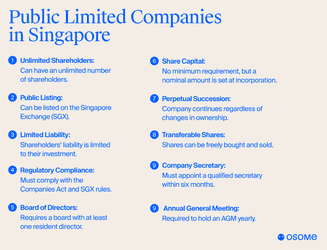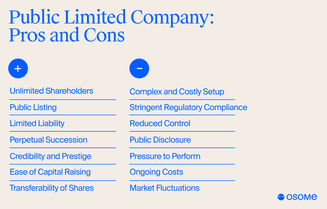Public Limited Company in Singapore: Guide to Benefits and Registration
- Published: 5 September 2024
- 9 min read
- Starting a Company


Heather Cameron
Author
From expert guidance and helpful accounting tips to insights on the latest trends in fintech, Heather is here to empower entrepreneurs and small business owners in Singapore with great content. With a background in digital marketing spanning eight years, she has experience writing for various industries and audiences. As Osome’s copywriter, she’s here to inform and inspire our readers with great storytelling.

Nisah Rahim
Reviewer
Nisah Rahim is our go-to expert reviewer for all things Corporate Secretary-related in Singapore. As the Corporate Secretary Team Lead and content reviewer, Nisah meticulously examines our blog posts to ensure we provide comprehensive information on Corporate Secretary services such as local regulatory compliance, managing board meetings, maintaining company records, and providing expert advice on corporate governance matters.
Interested in forming a public limited company in Singapore? A public company limited by shares offers unique advantages for foreign investors and local companies alike, providing the opportunity to raise significant capital through public investment. Understanding the different business structures, including the distinctions between a limited liability company and a private company limited by shares, is crucial for determining the best business structure for your needs.
Key Takeaways
- A Public Limited Company in Singapore allows for raising capital through public investments, accommodating over 50 shareholders with limited liability, making it a popular business structure for foreign investors and local companies alike.
- The registration of a public company limited by shares involves name reservation, preparation of essential documents, and appointment of a company secretary and director. If you're a foreign company, you'll need local representation, which could be set up as a Singapore branch office.
- While offering advantages such as increased access to capital and enhanced credibility, Public Limited Companies in Singapore face high compliance costs and the risks involved with market fluctuations and shareholder expectations.
Understanding Public Limited Companies in Singapore
A Public Company limited by shares in Singapore, commonly referred to as a Public Limited Company, is a type of limited liability company that empowers its owners to raise capital through shares or debentures.
A standout feature of this type of company is its capacity to have more than 50 shareholders, enabling the general public to buy shares and become part-owners. This not only broadens the shareholder base but also increases the potential of such a company to attract significant investment from diverse sources, including foreign investors and local public companies. Additionally, the liability of shareholders is limited to the amount of their share capital, providing a layer of financial security, protecting personal assets, and having the ability to issue a company limited by shares prospectus.
While we don’t offer public limited company registration services, we can assist you with incorporating a private limited company, sole proprietorship, or partnership — excellent options for anyone looking to start a business in Singapore.
In Singapore, a public limited company must include ‘Limited’ or ‘Ltd’ as a suffix in its name to clearly indicate its status as a limited liability company. This is part of the regulatory framework under the Companies Act that ensures transparency and accountability in the business environment for local companies and foreign companies alike. There are seven types of businesses that can be incorporated in Singapore, with public limited companies being one of the prominent options alongside private company limited, limited liability company, and limited liability partnerships.
Key Features of a Public Limited Company

A Public Limited Company has its own legal identity as a separate legal entity from its owners. This means it can own assets, enter contracts, and engage in legal proceedings in its own name. This separation of identity, common among corporate entities, provides a robust framework for protecting shareholders’ interests and ensuring the continuity of the business while safeguarding personal assets from the risks involved in business operations.
The shareholder structure can accommodate an unlimited number of shareholders, with a minimum requirement of 50. The minimum share capital required is S$50,000, with at least 25% paid up in cash or equivalent, ensuring that the business starts with a solid financial foundation.
Appointing a company secretary is mandatory for public limited companies. The company secretary plays a crucial role in ensuring compliance with legal and regulatory obligations, thereby maintaining the company’s good standing as a limited liability company, ensuring that the company adheres to statutory requirements under the Companies Act and remains compliant with Inland Revenue Authority regulations.
Registration Process for Public Limited Companies
The Singapore company incorporation and registration process in Singapore starts with reserving the company’s name and obtaining approval from the relevant authorities.
After reserving the name, the next step is preparing the company’s constitution. These documents outline the company’s corporate structure, purpose, and operational guidelines, which are essential for any limited liability company, sole proprietorship, or limited partnership.
Individuals with a foreign company or a branch office that are looking to incorporate in Singapore must engage a local corporate service provider. Before the registration can be finalised, a company secretary and at least one director must be appointed. The timeframe for incorporating a foreign company in Singapore can vary, ranging from one day to a few weeks, depending on the complexity and the involvement of the limited partnership or other company structures.
Raising Capital Through Public Offers
Public Limited Companies in Singapore hold a significant advantage in raising capital. They can issue shares or debentures to the public, allowing them to attract a broader pool of investors, including Singapore foreign investors. A public company limited by guarantee can secure substantial financial resources to support their growth and operations.

Issuing a prospectus is a key step in raising capital through public offers. This document, which must be registered with the Monetary Authority of Singapore, provides essential information about the company and its financial health to potential investors. Approval from both the board of directors and the shareholders is required before any public offer can be made by such a company.
Improved access to loans and credit from financial institutions is another benefit for public limited companies, thanks to their ability to raise funds through public offers. The process of share allotment involves completing necessary documents and filing them with the Accounting and Corporate Regulatory Authority (ACRA) within a specified timeframe. Legal exemptions can sometimes apply, especially for large businesses or a foreign parent company operating as a branch office in Singapore.
Compliance and Regulatory Requirements
Maintaining good corporate governance for public limited companies in Singapore requires compliance with the Singapore Companies Act and other statutory requirements. A company secretary who is a natural person and a resident of Singapore must be appointed. This role ensures that such a company adheres to all legal and regulatory obligations, particularly for a limited liability company.
Auditors must be appointed within three months of incorporation for Public Limited Companies unless they meet specific criteria for exemption. Regular audits are essential for maintaining transparency and accountability, which are crucial for gaining and retaining investor confidence. Additionally, any changes in shareholders, share capital subscribed, and company officers must be reported to the Accounting and Corporate Regulatory Authority (ACRA) within a stipulated timeframe.
Meeting these regulatory requirements can incur significant compliance costs. Maintaining compliance helps protect the limited liability company from legal issues and enhances its reputation among investors and stakeholders.
Advantages of Choosing a Public Limited Company
Choosing a Public Limited Company offers several advantages that can significantly benefit a business entity. Listing on a stock exchange boosts the company's visibility and credibility, making it more attractive to investors and partners. Enhanced visibility can lead to greater market opportunities and business growth for such companies.
Public Limited Companies can raise capital more effectively by offering shares, debentures, and bonds to the public. Additionally, shareholder liability in public companies is limited to the amount they invested in capital, providing a layer of financial security for investors.
Moreover, this can improve access to loans and credit from financial institutions due to the company’s enhanced credibility and financial transparency. This can provide the necessary financial resources to scale operations and achieve long-term business goals, especially for large businesses that need to capitalise on local tax incentives and navigate corporate tax rates.

Potential Drawbacks and Risks
Operating as a Public Limited Company comes with its own set of challenges and risks. One of the significant drawbacks is the high compliance costs associated with meeting regulatory requirements. These costs can be substantial and may impact the company’s profitability, especially for smaller businesses and subsidiary companies of a foreign parent company.
Operational challenges and risks can significantly impact the success of Public Limited Companies. These challenges include maintaining shareholder expectations, rigorous financial reporting, and the potential impact of market volatility on share prices. Managing these risks requires careful planning and robust governance structures, particularly for companies that operate as branch offices or a representative office of larger corporations.
Comparison with Other Business Entities
Several key differences emerge when comparing Public Limited Companies with other legal entities and business entities. For instance, a private limited company enjoys limited liability, meaning shareholders are only liable for the amount they have invested. In contrast, the owner of a sole proprietorship has unlimited liability, putting personal assets at risk if the business incurs debts.
Sole proprietorshipsface fewer regulatory requirements compared to private limited companies, which must adhere to strict compliance measures. However, a private limited company is recognised as a separate legal entity, unlike a sole proprietorship or partnership structure, which does not have this distinction.
Private limited companies can typically obtain funding more easily than sole proprietorships, which may struggle with creditworthiness. The perpetual succession of a private limited company means it can continue operating even if the owner passes away, offering greater stability and continuity.
Case Studies of Successful Public Limited Companies in Singapore
Sembcorp Marine’s recapitalisation plan during the pandemic exemplifies how companies can navigate financial challenges. By prioritising sustainability, Greenpac has not only improved its market position but also contributed positively to the environment. This alignment also positioned Greenpac as a leader among local public companies in Singapore.
Summary
In summary, when establishing a Public Limited Company, Singapore offers numerous benefits, including enhanced visibility, improved access to capital, and limited shareholder liability. However, it also comes with challenges, such as high compliance costs and operational risks. By understanding these aspects, business owners can make informed decisions about whether a PLC is the right business vehicle or business structure for their needs.
Considering the advantages and potential drawbacks, this can be a powerful vehicle for business growth and sustainability. Whether you are expanding an existing business or starting a new venture, exploring the option of a PLC could be a significant step towards achieving your business goals. Contact us today to learn more about how we can assist you in setting up and managing your Singapore company.
FAQ
How many types of companies can be incorporated in Singapore?
There are seven types of companies that can be incorporated in Singapore, including guarantee public company limited, unlimited public company, shares public company limited, and limited liability partnership. Singapore companies also benefit from various tax exemptions and local tax incentives.
What is the most common type of company in Singapore?
The most common type of company in Singapore is the Unlimited Exempt Private Company, which is preferred for its simplicity and beneficial regulations for small businesses. This business structure allows for a maximum of 20 shareholders, making it an ideal choice for private enterprises and a subsidiary company or representative office.
What is the maximum number of shareholders for an Exempt Private Company?
An EPC is limited to a maximum of 20 shareholders. However, unlimited public companies or companies limited by guarantee have different structures that allow for more shareholders depending on the company's goals.
What must a Public Company do before making any public offers?
A Public Company must register a prospectus with the relevant regulatory authority before making any public offers. This ensures compliance with legal requirements and provides essential information to potential investors. Additionally, proper accounting services are required to maintain transparent finances that reflect the share capital and operations of the company.
What distinguishes an Unlimited Private Company?
A UPC is distinguished by its hybrid nature, allowing for incorporation with or without share capital. This structure offers unique liabilities for its members compared to a limited liability partnership or other company structures, making it a distinct choice among corporate entities.
More like this
Get expert tips and business insights
By clicking, you agree to our Terms & Conditions,Privacy and Data Protection Policy
We’re using cookies! What does it mean?






